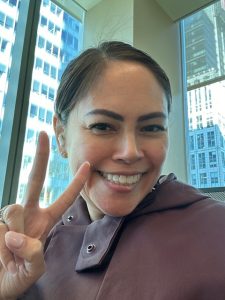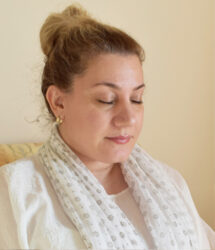Women in Technology: an interview

Technology jobs are among the most lucrative and fastest growing in corporate America. However, women choosing those roles often face negative day-to-day experiences and barriers to advancement opportunities. The Transcendental Meditation practice can be a powerful tool for women in such challenging work situations. We interviewed two women in tech, Tess Chu and Yvonne Gando, to hear their observations as well as how learning and practicing the Transcendental Meditation technique has affected their job and life experiences.
Q- Thank you for taking the time to share your thoughts with us. First, what attracted you to a career in the technology industry and what is your job today?
Tess: It’s cultural, and I found a knack for it. My dad’s a software engineer and my parents always encouraged me toward a math and science career. I dabbled in website building when the internet first came around. Then tried a computer course in high school and found it easy. I also very much enjoy self-improvement and listening and peer counseling friends, so the other option was psychology. I chose computers. Today I’m a Director of Engineering at Venmo and I get to combine my passion for helping people and my knack for problem-solving.
Yvonne: My journey into tech was unorthodox. My deep love for language and its nuances, honed through teaching university poetry, naturally led me to the dynamic and evolving world of technology. I was fascinated by how digital platforms could revolutionize communication and expression. Today, as a Senior Director of UX (creation of content to optimize the digital user experience), I blend my literary background with technological innovation to create user experiences that are not only functional but also emotionally resonant.
Q- Have you run up against gender-based barriers for advancement or have you seen it happen to other women? And, if so, please describe the situation.

Tess: When I first became a manager, one of my peers and to-be employees said to me with a shocked look, “It’s just that <pause> I’ve never had a female manager before….” Another employee refused to work for me, and in a one-on-one meeting he said, “You’re not qualified to be my manager.” I was once called “bossy” because I gave my manager feedback that our meetings lacked a clear agenda and structured outcomes. Would he have said this about a man? I was at that job for five years without a promotion, after which I left for a better company.
Yvonne: Absolutely, gender-based barriers are a stark reality in the tech industry. As I progressed in my career, I often found myself being the only woman in the room. I’ve faced instances where my ideas were overlooked or attributed to male colleagues. This is not just my story; many of my female colleagues have encountered similar challenges. It’s a systemic issue that requires continuous effort and awareness to overcome.
Q- Has your practice of Transcendental Meditation added value to yourwork situation,and in what ways?
Tess: Yes! I am a high-achieving individual and take pride in the quantity and complexity of problems I help with, but on many days this often takes a toll on my energy and patience. The stress causes sleep issues which creates a negative feedback loop, leading to burnout. TM really helped me dial it back, creating space so that I can deliberately choose to take things more even-keeled. I still have bad days, but there are many more good ones than bad now.

Yvonne: Transcendental Meditation has been transformative. It has enhanced my clarity of thought and decision-making abilities. In a high-stress environment, TM has been my anchor, helping me approach challenges with a calm and focused mind. It’s not just about stress reduction; it’s about accessing a deeper level of creativity and problem-solving capability.
Q- Have you observed that work-life balance has changed?
Tess: Almost immediately I noticed I got my evenings back after starting TM. I used to be so fried after a long workday that I would pass out on the couch right after dinner. I would scroll my phone while my husband made dinner, and was rarely present. I consider this by itself worth the daily time I invest in TM.
Yvonne: Yes, there has been a noticeable shift in my work-life balance since practicing TM. The mental space and peace it provides have allowed me to be more present, both at work and at home. I find myself less consumed by work-related stress in my personal time, which has significantly improved my overall quality of life.
Q- Since you learned TM, what changes have you noticed in your relationships with coworkers, family and friends?
Tess: The biggest change I noticed is my relationship with my two kids Alan (5) and Ada (8). They are more loving toward me and we are creating many more memorable moments together. I’ve also taken a more proactive role in their lives. Before TM, I never wanted to invest any extra time toward after-school activities because I just didn’t have the willpower to add more to my plate. I’ve since gotten Alan started with tutoring (he needs more one-on-one time) and I’m invested in scheduling all of the sessions and getting him there. Ada started joining me with gardening: starting seeds, preparing the bed, and fertilizing my plants.
Yvonne: Post-TM, there’s a greater sense of empathy and patience in my interactions. Be it with coworkers, family, or friends, I find myself listening more and reacting less. This change has fostered stronger, more meaningful connections and has helped in building a collaborative and supportive work environment.
Q- Have there been changes in how you feel about yourself?
Tess: My mood is much more even-keeled. I definitely have fewer low days, but I’m also not as easily excitable. Things are calm and happier maybe about 50% of the time, which is a great improvement! I’m really enjoying the added energy which makes my days much more predictable even when I have a night of poor sleep. Even my husband can attest to my improved calmness!
Yvonne: Learning TM has led to a profound change in how I perceive and value myself. It has boosted my confidence and self-awareness, making me more resilient to the external pressures of my job. There’s a newfound inner strength that comes from being in tune with my mental and emotional state.
Q- What suggestions doyou have for women considering a career in tech?
Tess: We need more of you! The number of women graduating with computer science degrees is dwindling. Yet tech is one of the highest-paying jobs out there. Women are making a fraction of the money that men do across the board, and having more women in tech will help bridge the gender pay gap. There are too many men in tech which sometimes scares women away because women can’t imagine themselves in those roles. Don’t let that discourage you. We need more diversity in the field because half of the consumers of tech are also women and innovation requires diversity! Women can be just as good problem-solvers as men, if not better, because we have stronger empathy. The best problem-solvers are those who understand the root of the customer’s problem deeply. Those who can empathize deeply can tap the best types of solutions.
Yvonne: For women considering a career in tech, my advice is threefold:
- Stay Curious. The tech world is constantly evolving. Keep learning and be open to new ideas.
- Build Resilience: You’ll face challenges, but remember, every challenge is an opportunity to grow.
- Find Your Support System: Whether it’s mentors, peers, or a network of like-minded professionals, having a support system is invaluable. And finally, consider the TM practice to maintain your wellbeing. It’s not just about succeeding in your career but thriving in it.
Q- Anything else you’d like to share?
Tess: TM is one of the easiest things I’ve ever done that’s brought back a much higher return on investment on my health, wellbeing, and quality of life. My work life has always been the foundation of my happiness and TM has helped me keep it under control so that I can live my real life.
THRIVE IN YOUR CAREER: CONTACT A LOCAL CERTIFIED TM TEACHER Out More
About the Author
Sarah Gordon is a Learning Specialist with an MA from Columbia University’s Teachers College. After decades in private practice offering diagnostic assessment and therapeutic intervention to optimize her clients’ learning, she is currently teaching the Transcendental Meditation program in San Diego.





